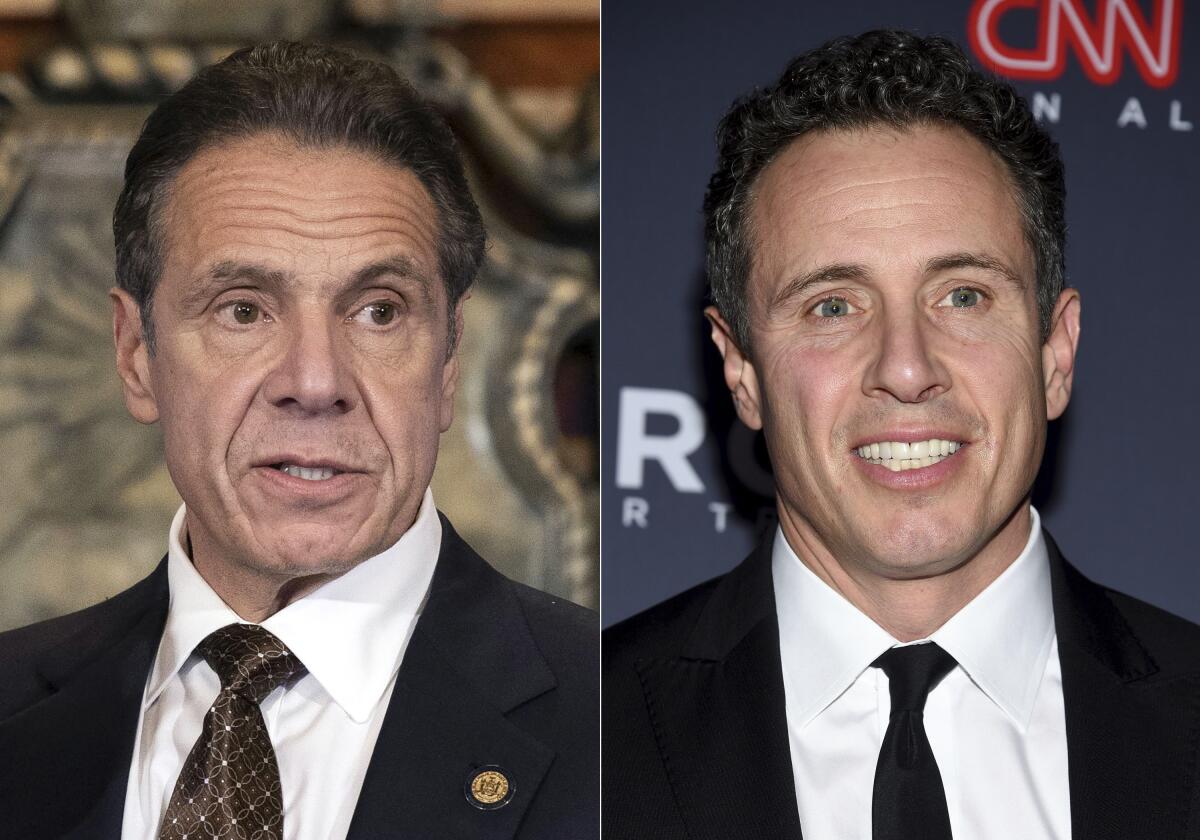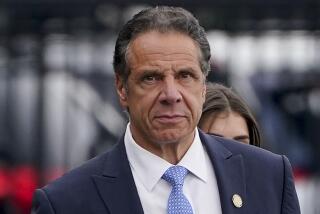Chris Cuomo’s big off-air role: Brother Andrew’s strategist

- Share via
NEW YORK — CNN anchor Chris Cuomo had a bigger role than previously known in helping defend his brother, former New York Gov. Andrew Cuomo, from sexual harassment allegations that forced him from office, newly released transcripts and text messages show.
The TV journalist offered to reach out to “sources,” including other reporters, to find out whether more women were going to come forward and relayed what he was hearing to his brother’s advisors, according to the materials made public Monday.
He also sparred with the former governor’s aides over strategy, urging an apologetic tone and critiquing an early statement that he saw as downplaying the allegations. He also accused a top aide of hiding information from his brother.
At the same time, Chris Cuomo told investigators he spoke regularly with his brother, coaching him on his response and admonishing him for “bad judgment.”
Chris Cuomo previously acknowledged it was a “mistake” to act as his brother’s unofficial advisor, but the full extent of his involvement — including using journalistic contacts to scope out accusers — only became clear with Monday’s release of his July interview with investigators and 169 pages of text messages, emails and other communications.
“I was worried that this wasn’t being handled the right way, and it’s not my job to handle it, okay?” Chris Cuomo told investigators, according to the transcript. “I don’t work for the governor.”
Andrew Cuomo resigned in August to avoid a likely impeachment trial, after an investigation led by state Atty. Gen. Letitia James found he sexually harassed at least 11 women.
Chris Cuomo, the host of CNN’s “Cuomo Prime Time,” said he never reported on his brother’s situation for the network and never tried to influence coverage. On-air in August, he said: “I tried to do the right thing,” adding he “wasn’t in control of anything.”
CNN issued a statement saying the transcripts and exhibits “deserve a thorough review and consideration. ”
“We will be having conversations and seeking additional clarity about their significance as they relate to CNN over the next several days,” it said.
Jane Kirtley, director of the Silha Center for the Study of Media Ethics and Law at the University of Minnesota, said journalists must understand they’re working for the public, not politicians.
Kirtley said the extent of Chris Cuomo’s involvement in advising his brother is inappropriate, and since they’re brothers, “Maybe it’s time for him to find another line of work.”
She urged CNN to address the matter promptly, saying: “You can’t act like this is not happening. You’re a news organization.”
Monday’s releases show Chris Cuomo growing frustrated with his brother’s advisors as they scrambled to respond as more women came forward with harassment allegations.
The anchor pressed for greater involvement in crafting his brother’s message and offered up his journalistic sleuthing to find out what other allegations might be looming.
On March 4, Chris Cuomo texted the governor’s top aide, Melissa DeRosa, saying “I have a lead on the wedding girl,” referring to a woman who accused his brother of unwanted touching at a wedding reception.
On March 7, as rumors swirled that more women were about to come forward, DeRosa texted Chris Cuomo: “Can u check your sources.” He replied, “On it.”
“When asked, I would reach out to sources, other journalists, to see if they had heard of anybody else coming out,” Chris Cuomo said in the July deposition.
In one instance, Chris Cuomo said he called a journalist who regularly worked with reporter Ronan Farrow to get information about Farrow’s upcoming article, and didn’t tell anyone at CNN what he was doing. He let DeRosa know the article wasn’t ready for publication yet.
In a March 10 text message, Chris Cuomo lashed out at DeRosa, accusing her of keeping information from his brother after the Albany Times-Union published an interview with an accuser.
“Stop hiding s---,” Chris Cuomo wrote. “We are making mistakes we can’t afford.”
Asked in his deposition about that text, Chris Cuomo explained he was telling her: “Don’t not tell Andrew things.”
“There were conversations that he wasn’t a part of that I thought it was important for him to stay very locked in on these,” Chris Cuomo testified.
Among this latest batch of investigative materials released by James’ office is a video of Andrew Cuomo’s deposition from July — a transcript was made public about three weeks ago — and transcripts or videos of interviews with several Cuomo aides and advisors.
James’ office said it initially didn’t release these because local prosecutors were reviewing them for potential criminal conduct. After a criminal complaint was filed against Cuomo last month, giving him access to the materials through discovery, James’ office said it would make them public “in an effort to provide full transparency.”
The releases were being done on a rolling basis — first with transcripts of the former governor and accusers on Nov. 10 and Monday with his brother, aides and other figures — to allow time for redactions to protect individual privacy, James’ office said.
DeRosa, in her interview released Monday, recalled confronting Andrew Cuomo during a car ride about the allegations. She told investigators that after one accuser came forward, they decided Cuomo would no longer be left alone with junior staff.
Asked about her exchanges with Chris Cuomo, DeRosa testified: “I talked to Chris pretty regularly. He was on some calls that we did, and he advised us on how to respond.”
Villeneuve reported from Albany. Associated Press reporters Jennifer Peltz, David Bauder and Thalia Beaty in New York and Michael Hill in Albany contributed to this report.
More to Read
Sign up for Essential California
The most important California stories and recommendations in your inbox every morning.
You may occasionally receive promotional content from the Los Angeles Times.













